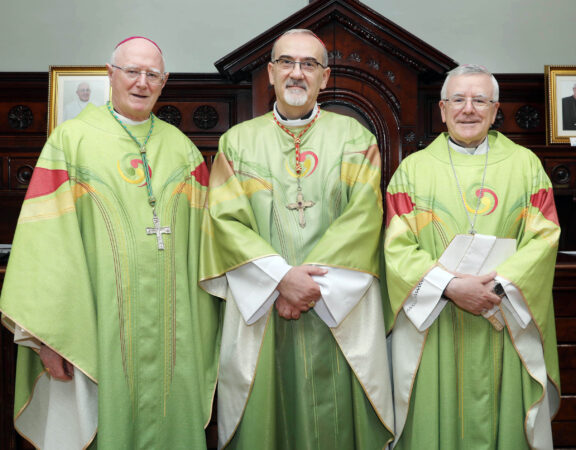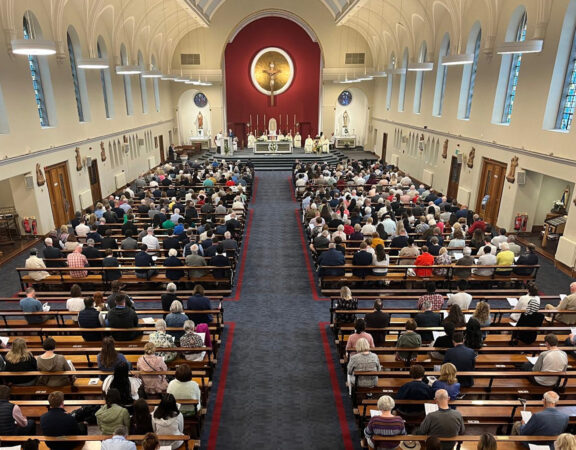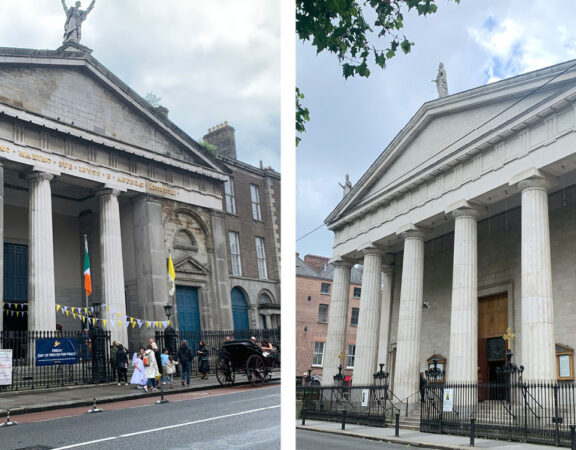MASS WITH THE DEAF COMMUNITY
Homily Notes of Most Rev. Diarmuid Martin, Archbishop of Dublin
Emmaus Chapel, Deaf Village, Dublin, 8th November 2015
“I am always very happy to celebrate Mass here in this Emmaus Chapel with the Deaf community. I know the work of the Chaplaincy in supporting you on your journey of faith and I am pleased to see how the Catholic Deaf community is well integrated into the life of the Archdiocese of Dublin, being present at major diocesan events, at the pilgrimage to Lourdes and on other occasions. I greet the members of the Deaf choir.
You wanted to celebrate the memory of Monsignor William Yore, an extraordinary priest of the diocese of Dublin, born in the eighteenth century, who lived through the challenging period of the emergence of the Catholic community from political social and religious exclusion. Monsignor Yore was a giant of a man and I am looking forward to visiting the heritage centre to see the exhibition you have dedicated to his memory.
As I said, Monsignor Yore began his ministry at a time in which the Catholic community was re-finding its position in society after decades of exclusion and persecution. It would have been easy for him to sit back and enjoy and be proud and acquiesce in that new found freedom. That was not Monsignor Yore. He dedicated himself to renewal and evangelization and the care of his flock.
He was involved in the building of the Parish of Saint Paul in Arran Quay; he was responsible for calling the Vincentian Fathers to Phibsborough; he was responsible for the creation of Glasnevin Cemetery and was the organizer of the funeral there of Daniel O’Connell; he was responsible – and that is why we are here today – for the establishment of the Catholic Institute for Deaf People.
We have to remember that at the time of Monsignor Yore there was absolutely nothing available to help young deaf men and women. There was no health care service, no social services. For young deaf people who were also poor, they were simply marginalized and excluded. Monsignor Yore sold his own collection of books to establish the new Institute where, with all its limitations, at least young deaf boys and girls could get basic schooling and were prepared to enter more fully into the life of society.
We are talking about a world of a century and a half ago. Much has changed in the world of deaf people in Dublin over these years. Things have changed and improved. Other things have changed and indicate that perhaps older ways are no longer the best. In today’s world, change is of the order of the day and it is important that we adopt to change with vison and courage.
Our Gospel reading is an interesting one. The passage we have just heard comes immediately after a series of tough discussions which Jesus had in the Temple with various religious representatives and groups. Now Jesus sets out to teach his disciples of how the religion of the Temple must change to a new Covenant.
What can this Gospel text tell us about how we deal with change in the Church of Jesus Christ in our time? How must we today as individual believers and as Christian communities live in order to avoid repeating the empty worship which Jesus challenged – not so much of the Temple itself – but of many of those who had leadership roles in the Temple religion of his time?
Jesus’ words are strong. He speaks of those who do works that are good and correct but who use those works to benefit their own position or standing rather than for the glory of God. Jesus condemns the scribes because they had lost the sense of their real role and had begun to think only of themselves and their privileges and their prerogatives. By becoming focussed on themselves and their privileges they lost the real sense of religion and of God.
When the Church becomes trapped into a logic of looking after its own privilege and power first, then a situation arises very quickly in which nothing else counts. Jesus says of the scribes that they were even prepared to “swallow up the property of the widows” to achieve their own satisfaction and we know that in biblical terms widows and orphans represent the marginalized of any kind.
Jesus’ words are strong, but if we look closely at them they are not just the words of Jesus. Jesus in fact is quoting the language of the prophets, especially Isaiah or Jeremiah or Amos, to express his condemnation. In that sense Jesus is reminding his hearers – and indeed reminding us many generations later – that the temptation to hypocrisy and disregard for others is in fact a temptation which is recurrent in history, a temptation which can continuously repeat itself.
When we reflect on this history of this Institute, we have to remember that that history was marked over the years also by dark moments in which the cry of children was not heard, betraying the message of Jesus.
In our Gospel reading, Jesus is not just condemning. Jesus is saying that history will always need prophets, men and women of absolute integrity who can rise up as authentic voices to recall men and women each generation to come back to what is authentic in faith. The Gospel reading we have heard is a call to leadership in a different and more authentic way and we should be grateful to a new generation of deaf people who are responding to that call today, despite the many challenges they still meet.
We need a Church which can respond more effectively to change. I spoke some time ago of a “reality check”; I could also have said “a wakeup call”. Times have changed in Irish society and the Church must change. The Church must change not to go along with society and neither to opt out of society, but to find the best space possible to be free and unencumbered to bring the challenging message of Jesus Christ to society.
The Church must free itself and become unencumbered even from positions which may in the past have been positive and useful to both Church and society, including in the control of schools and institutions. The Church is slow to change. Inertia may seem to mean that things can go on as they were and are; but the opposite is the case. The message of Jesus is always a wakeup call, and wakening up – at least for someone like me who is not an early morning person – is always uncomfortable.
We celebrate one hundred and fifty years of this Institute and we look on what has happened and what has been achieved and what should not have happened. But the Christian celebrates, above all, by looking forward and by praying and allowing the healing power of Jesus to change hearts.” ENDS







